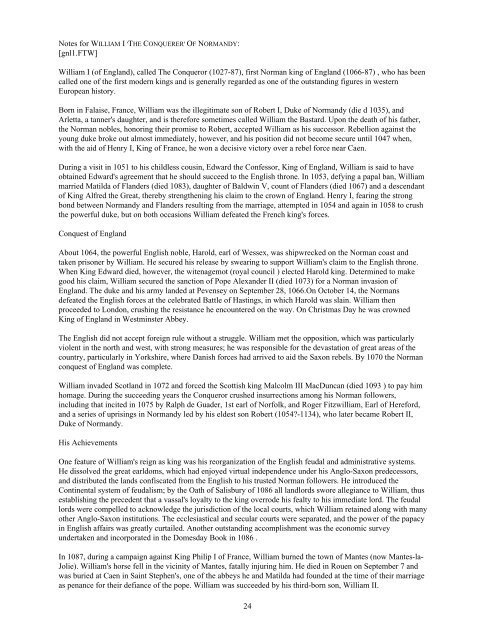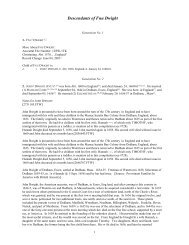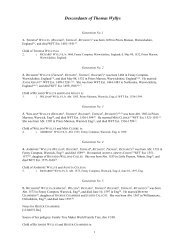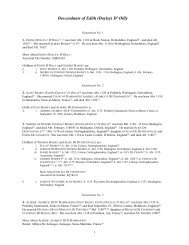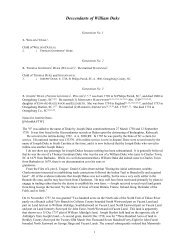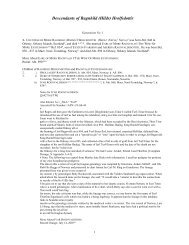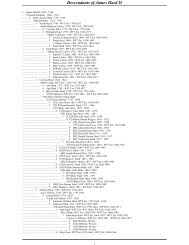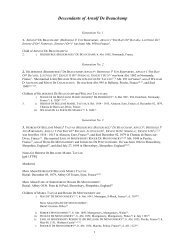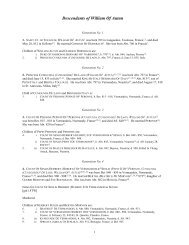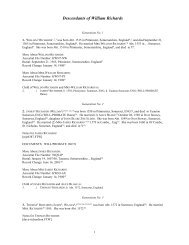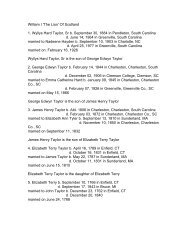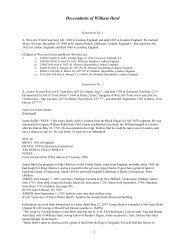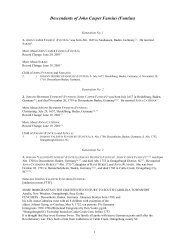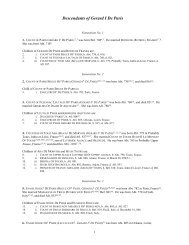Aethelwulf Of England.pdf - GBLCreations
Aethelwulf Of England.pdf - GBLCreations
Aethelwulf Of England.pdf - GBLCreations
You also want an ePaper? Increase the reach of your titles
YUMPU automatically turns print PDFs into web optimized ePapers that Google loves.
Notes for WILLIAM I 'THE CONQUERER' OF NORMANDY:<br />
[gnl1.FTW]<br />
William I (of <strong>England</strong>), called The Conqueror (1027-87), first Norman king of <strong>England</strong> (1066-87) , who has been<br />
called one of the first modern kings and is generally regarded as one of the outstanding figures in western<br />
European history.<br />
Born in Falaise, France, William was the illegitimate son of Robert I, Duke of Normandy (die d 1035), and<br />
Arletta, a tanner's daughter, and is therefore sometimes called William the Bastard. Upon the death of his father,<br />
the Norman nobles, honoring their promise to Robert, accepted William as his successor. Rebellion against the<br />
young duke broke out almost immediately, however, and his position did not become secure until 1047 when,<br />
with the aid of Henry I, King of France, he won a decisive victory over a rebel force near Caen.<br />
During a visit in 1051 to his childless cousin, Edward the Confessor, King of <strong>England</strong>, William is said to have<br />
obtained Edward's agreement that he should succeed to the English throne. In 1053, defying a papal ban, William<br />
married Matilda of Flanders (died 1083), daughter of Baldwin V, count of Flanders (died 1067) and a descendant<br />
of King Alfred the Great, thereby strengthening his claim to the crown of <strong>England</strong>. Henry I, fearing the strong<br />
bond between Normandy and Flanders resulting from the marriage, attempted in 1054 and again in 1058 to crush<br />
the powerful duke, but on both occasions William defeated the French king's forces.<br />
Conquest of <strong>England</strong><br />
About 1064, the powerful English noble, Harold, earl of Wessex, was shipwrecked on the Norman coast and<br />
taken prisoner by William. He secured his release by swearing to support William's claim to the English throne.<br />
When King Edward died, however, the witenagemot (royal council ) elected Harold king. Determined to make<br />
good his claim, William secured the sanction of Pope Alexander II (died 1073) for a Norman invasion of<br />
<strong>England</strong>. The duke and his army landed at Pevensey on September 28, 1066.On October 14, the Normans<br />
defeated the English forces at the celebrated Battle of Hastings, in which Harold was slain. William then<br />
proceeded to London, crushing the resistance he encountered on the way. On Christmas Day he was crowned<br />
King of <strong>England</strong> in Westminster Abbey.<br />
The English did not accept foreign rule without a struggle. William met the opposition, which was particularly<br />
violent in the north and west, with strong measures; he was responsible for the devastation of great areas of the<br />
country, particularly in Yorkshire, where Danish forces had arrived to aid the Saxon rebels. By 1070 the Norman<br />
conquest of <strong>England</strong> was complete.<br />
William invaded Scotland in 1072 and forced the Scottish king Malcolm III MacDuncan (died 1093 ) to pay him<br />
homage. During the succeeding years the Conqueror crushed insurrections among his Norman followers,<br />
including that incited in 1075 by Ralph de Guader, 1st earl of Norfolk, and Roger Fitzwilliam, Earl of Hereford,<br />
and a series of uprisings in Normandy led by his eldest son Robert (1054?-1134), who later became Robert II,<br />
Duke of Normandy.<br />
His Achievements<br />
One feature of William's reign as king was his reorganization of the English feudal and administrative systems.<br />
He dissolved the great earldoms, which had enjoyed virtual independence under his Anglo-Saxon predecessors,<br />
and distributed the lands confiscated from the English to his trusted Norman followers. He introduced the<br />
Continental system of feudalism; by the Oath of Salisbury of 1086 all landlords swore allegiance to William, thus<br />
establishing the precedent that a vassal's loyalty to the king overrode his fealty to his immediate lord. The feudal<br />
lords were compelled to acknowledge the jurisdiction of the local courts, which William retained along with many<br />
other Anglo-Saxon institutions. The ecclesiastical and secular courts were separated, and the power of the papacy<br />
in English affairs was greatly curtailed. Another outstanding accomplishment was the economic survey<br />
undertaken and incorporated in the Domesday Book in 1086 .<br />
In 1087, during a campaign against King Philip I of France, William burned the town of Mantes (now Mantes-la-<br />
Jolie). William's horse fell in the vicinity of Mantes, fatally injuring him. He died in Rouen on September 7 and<br />
was buried at Caen in Saint Stephen's, one of the abbeys he and Matilda had founded at the time of their marriage<br />
as penance for their defiance of the pope. William was succeeded by his third-born son, William II.<br />
24


